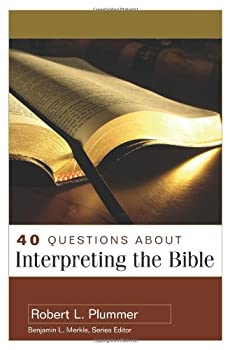Biblical Studies
-
A Timely Reminder From Titus
A timely reminder from Titus (specifically, Titus 3:1-2), for me and my brothers and sisters in Christ: Be submissive to rulers and authorities Be obedient Be ready for every good work Speak evil of no one Avoid quarreling Be gentle Show perfect courtesy toward all people Why? For we ourselves were once foolish, disobedient, led astray, slaves to various passions and pleasures, passing our days in malice and envy, hated by others and hating one another. But when the goodness and loving kindness of God our Savior appeared, he saved us, not because of works done by us in righteousness, but according to his own mercy, by the washing of…
-
Next!
Currently mid-way on Intro to New Testament 2 with Tom Schreiner, but in the mail came some of the texts for my next class. I’ll be taking Personal Spiritual Disciplines with Don Whitney over the winter term. Two of those are extra credit, but look really promising (both the Whitney books). I already had the other texts required for the course, Whitney’s Spiritual Disciplines for the Christian Life and Pilgrim’s Progress.
-
In The Mail: CSB
So, class number two started yesterday: Intro to New Testament 2, taught by Tom Schreiner (woohoo!). Noted from the syllabus that we have to read Acts through Revelation (the scope of the class) in either the NIV or CSB. I usually read in the ESV these days, so decided to send out for a copy of the CSB. I got the study version, and not the single column version, though I was tempted. Been a while since I’ve used a study bible and not certain this was the best version to choose for a study bible, but thought it was worth trying out. Looks nice, anyway! Smells good, too!
-
Pastries
In his discussion on “Qualifications of Inerrancy” in 40 Questions About Interpreting The Bible, Robert Plummer encourages pastry-making informed by appropriate sources: 7. Inerrancy does not mean that the Bible provides definitive or exhaustive information on every topic. No author in the Bible, for example, attempts a classification of mollusks or lessons in subatomic physics. The Bible tangentially touches on these subjects in asserting that God is the creator of all things, marine or subatomic, but one must not press the Scriptures to say more than they offer. If you want to learn how to bake French pastries, for example, there is no biblical text that I can suggest. I…
-
In the Mail, Fall 2020 SBTS Edition
So, here is what I will be reading (above and beyond the stuff I am already reading) for my first semester (fall, the first two of six class blocks during a year of online instruction): F1: Biblical Hermeneutics Required. These, in no particular order, are the required books for my first session: From Eden to the New Jerusalem: An Introduction to Biblical Theology, T. Desmond Alexander Getting the Message: A Plan for Interpreting and Applying the Bible, Daniel M. Doriani 40 Questions About Interpreting the Bible, Robert Plummer How to Read and Understand the Biblical Prophets: How to Read and Understand the Biblical Prophets, Peter J. Gentry Optional. I ordered…
-
The Special Case of Conversation
I found myself laughing quite loudly, and re-reading this passage to my wife to help her share in my enjoyment. I’m not sure I succeeded, but I will share with you all nonetheless. The subject is conversation, and in the specific passage, the authors are beginning to illuminate the “presupposition pool”. Even more specifically, the idea that speakers naturally exclude or include content based on these shared concepts. …Any speaker will necessarily make certain assumptions about his listeners and will fashion what he has to say accordingly. For example, he will not unnecessarily explain such technical terms as he may use unless he is fairly sure that explanation is required;…
-
In The Mail – Post Father’s Day Edition
My daughter is a keeper:
-
Linguistics & Biblical Interpretation
So far, I’m very much enjoying Linguistics & Biblical Interpretation, by Cotterell & Turner. Very easy to read and understand, as it strives to lay a foundation for the value of linguistically-supported study of Scripture. I found the following, from the chapter on the pitfalls of word studies, interesting: …my concept of ‘boy’ in the more general usage may include very many features concerning the range of their features and physique, their hygiene, their habits of play, their social abilities and limitations, and so forth, none of which is linguistically attached to the word ‘boy’ as such at all. The sentences (1) Boys are usually male,(2) Boys are usually unkind,…
-
In The Mail: Lexical Semantics
I spend (likely) too much time over at Nerdy Language Majors. Between that and Koine-Greek, I always have something new and interesting to learn and grapple with. And sometimes, it is useful just to find books worth picking up. So, HT to Keith Surland for pointing out Lexical Semantics of the Greek New Testament, by Nida & Louw, a week or so back. I look forward to spending time in it soon!
-
In the Mail: William’s Hebrew Syntax
The fine people of Amazon dropped off this delightful package this morning. I’ve been focusing primarily on Classical Greek (and Latin, French, German and a smidge of Korean and Modern Greek) at the moment, but soon…


